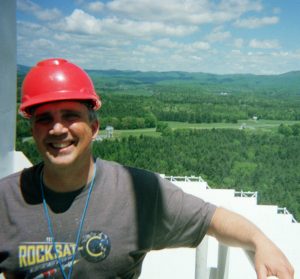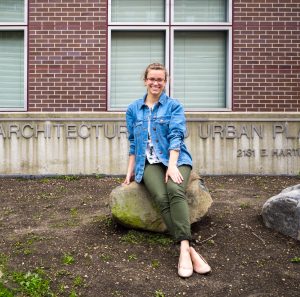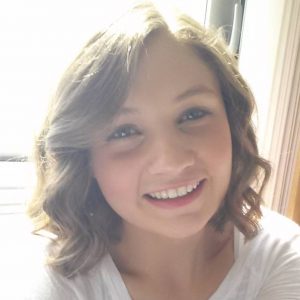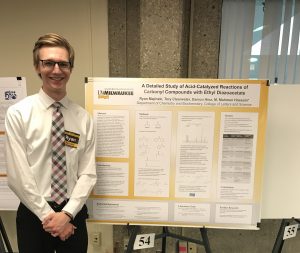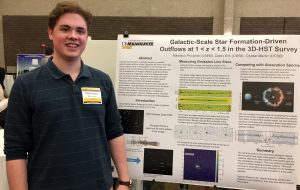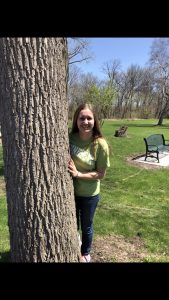Bob Aloisi is a senior studying Physics and Mathematics as he prepares to apply to an Astrophysics PhD program. He has been working in the Physics Department with Dr. David Kaplan, Dr. Joseph Swiggum and Dr. Angela Van Sistine. During his first semester at UW Milwaukee, a First Year Research Experience course gave him the opportunity to help find timing solutions to determine the properties of four recently discovered pulsars, which are compact, very dense stars that emit frequent pulses of radio energy as they spin. He followed up as the lead author on a paper documenting the results that was recently published in The Astrophysical Journal. He had the opportunity to present a project poster at the American Astronomical Society Winter meeting in January 2019. He was awarded a second SURF project
in Summer and Fall 2018 to help update the Census of the Local Universe galaxy catalog, which is referenced when gravity waves are detected. This catalog helped find multi-wavelength counterparts to a neutron star merger in 2017. An updated catalog was published with about 15% more galaxies, which is currently being used during the third Laser Interferometer Gravitational-Wave Observatory run. He is currently working on a Global Relay of Observatories Watching Transients Happen (GROWTH) SURF project at the University of Sydney with Dr. Tara Murphy studying transient signals detected by a new radio telescope array called the Australian Square Kilometer Array Pathfinder. In this project, he is learning to process images and find flux values for radio sources to help identify and classify transient sources. He has been active in other research activities including restarting the Students for the Exploration and Development of Space (SEDS) student group, which developed payloads that were launched on NASA sounding rockets through the Rocksat-C program in 2017 and 2018. The team travelled to the launch and presented posters at UWM, Wisconsin Space Grant Council (WSGC), and other forums. His other outreach activities include printing 3-D models of the Solar System as part of the UWM Prototyping Club. These models are displayed outdoors at UW Green Bay, Sheboygan campus’ Stroll Thru the Solar System walk. Email: robert.aloisi@sydney.edu.au
Bella Biwer is a senior at UWM and plans to graduate with Honors in 2020 with a BS in Architecture and a minor in Structural Engineering. She has worked with Dr. Arijit Sen since the Summer of 2016, and has performed extensive research in the Sherman Park, Washington Park, and Thurston Woods neighborhoods of Milwaukee. Bella’s research includes “The Architecture of Home in Washington Park and Thurston Woods”, “The Architecture of Place: Amaranth B-akery and Café”, “Physical and Social Boundaries in Residential Architecture, Washington Park and Thurston Woods”, and “A Comparative Analysis of Safety in the Built Environment, Sherman Park”. Her current work considers the discontinuity between how grassroots organizers and scholars talk and think about the problem of safety in the urban environment. To address this issue, Bella and Dr. Sen have conducted multiple community-led Jane Jacobs Walks on the North Side of Milwaukee. The result is “Countermapping Sherman Park”, an interactive map of Sherman Park, Milwaukee that counters cartographical norms. In 2020, this work will be displayed at the Humanities Action Lab’s Initiative on Climate and Environmental Justice at Rutgers University-Newark. During the 2019-2020 school year, Bella will also be co-authoring an article with Dr. Sen on safety in the urban environment, and will be serving as Secretary and Co-Media Director of UWM’s National Organization of Minority Architecture Students (NOMAS) chapter. Email: bebiwer@uwm.edu.
Bailey Flannery is a senior pursuing a major in English, minors in French and Women’s & Gender Studies, and an Honors Degree with Distinction. She has been working with Dr. Jacqueline Stuhmiller on various projects since the fall of 2017, including the compilation and editing of the volume Animal Husbandry: Bestiality in Medieval Culture (under consideration by Brill). Flannery’s current research interests are transformation and fluidity, the woman-animal interface, the monstrous female body, and feminist and post-humanist theory, and she has presented papers at the UWM and UW System Undergraduate Research Symposiums, the Virginia Humanities Conference, and the Arizona Center for Medieval and Renaissance Studies Conference. In addition to serving as TEDxUWMilwaukee’s Director of Curation for two years, she is also the Co-Founder of HARPY (the Honors Association for Research and Publication), which empowers a cohort of impassioned young scholars to explore research in the humanities and social sciences and present their research. HARPY plans to release the first volume of its undergraduate academic journal (HARPIES) in the spring of 2020. Email: flanne36@uwm.edu.
Ryan Majinski is a senior studying Biomedical Sciences with an emphasis on Medical Laboratory Science; he is also a part of the premedical program at UWM. Ryan has been working under the instruction of Dr. M Mahmun Hossain since September, 2016. Within the field of medicinal synthesis, a subset of organic chemistry, Ryan’s first project studied the formation of 3-hydroxyacrylic acid esters from commercially available ketone and aldehyde starting materials. The particular reaction used, developed previously by the Hossain Laboratory Group, can serve as a simple, cost-effective first step in the formation of dozens of biologically active compounds, including many common painkillers. With the conclusion of this project, Ryan will use his final year to research the synthesis of all-carbon quaternary stereocenters. These molecules again have the ability to form potent medicinal compounds. Previous work in the Hossain Laboratory used aldehydes to form the stereocenters; Ryan will study the use of ketone starting materials, which are inherently less reactive than their aldehyde counterparts. However, the successful completion of this project will open the door to the concise synthesis of countless modern medicines. Outside of his research, Ryan serves as the President of the American Medical Student Association, a role he first undertook in May, 2017. He also volunteers as a Clinical Navigator at a local pediatric clinic, where he connects primarily low-income families to needed resources within the community, ranging anywhere from food pantries to childcare. After obtaining his degree and certification in Medical Laboratory Science, Ryan plans on attending medical school to pursue a career in pediatrics. Email: majinsk3@uwm.edu.
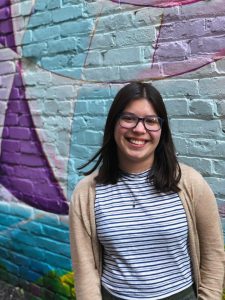
Tessa Miskimen is a senior studying Psychology who has actively participated in Dr. Deborah Hannula’s research lab since January 2017. She began her work in the lab by assisting with an ongoing project looking at how fear conditioning can influence people’s eye movements. She’s since presented the findings of this project at past research conferences such at the UW-Milwaukee Undergraduate Research Symposium (with an award for Outstanding Presentation two years in a row), the UW-System Research Symposium, and the National Conference of Undergraduate Research in Georgia. Tessa has been supported since Fall 2017 through the SURF program. Since gaining a basis of knowledge around this project, Tessa took interest in taking the lead on her own project from beginning to end. Since this, she learned to code, counterbalance and work with multiple different software’s to create a working experiment under Dr. Hannula’s supervision. This year, she plans to finish this project and present the findings at multiple conferences both in and out of the state. Along with her participation in research, Tessa has also worked as a Resident Assistant in University Housing for two years. After graduation, Tessa plans to pursue a graduate level degree in Clinical Psychology to allow her to become a licensed mental health counselor in order to help and advocate for those who have mental illnesses. Email: miskime2@uwm.edu.
Nikolaus Prusinski is an 18-year-old senior at the University of Wisconsin – Milwaukee pursuing astrophysics, mathematics, and music. Currently, he is working with Prof. Dawn Erb in Physics studying the connection between star formation and galactic scale outflows of gas in the early universe. Intense star formation in galaxies leads to powerful outflows of gas, and since stars form from gas, these outflows significantly affect the galaxy’s evolution, but the intricacies of the process are still unknown. Using data from both the Hubble Space Telescope and the Keck Telescope, Dr. Erb and Nik are trying to determine how the outflow properties relate to galaxy structure. In addition to research, Nik maintains an active performance schedule, playing horn and piano in numerous local ensembles, both on and off campus. He is also lead stargazer at the UWM Planetarium, where he presents live stargazing shows to the general public, either outside on the Physics Skydeck, or inside in the planetarium. Through a generous donation, Nik was able to install and set up a permanently mounted computerized telescope capable of astrophotography on the roof of the physics building. The telescope has given him the ability to mentor students, conduct observations, and learn techniques in observational astrophysics. Looking forward, Nik plans to attend graduate school in astrophysics and eventually become a university professor, researching and teaching in this area. Email: prusinsk@uwm.edu, Website: www.nzp.guru.
Nicole Vigon is a senior in Biomedical Engineering. She is currently doing research in engineering and health sciences and has worked under the direction of Dr. Brooke Slavens since spring of 2017. The project Nicole has been involved with at the lab, partners with Children’s Hospital, to define the phenotype of hypermobile type Ehlers Danlos Syndrome (hEDS) in children, ages 8-18. Within this project Nicole is analyzing the kinematics, kinetics and temporal spatial parameters of gait of these children. Nicole has the great honor to be the College of Engineering and Applied Science Ambassador; in this role she shares her experience at UWM with teachers across the state, parents and perspective students. Additionally, Nicole is a College of Engineering mentor to first year students and peer mentor in WiscAMP. Nicole is the cofounder of Supermilege at UWM, where she has held the title of President for the past two years. She is also an active member in the Society of Women in Engineering. Ultimately, she wants to pursue a doctorate in Biomedical Engineering, and research for advancements in prosthetics. Email: navigon@uwm.edu.
